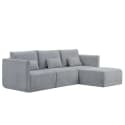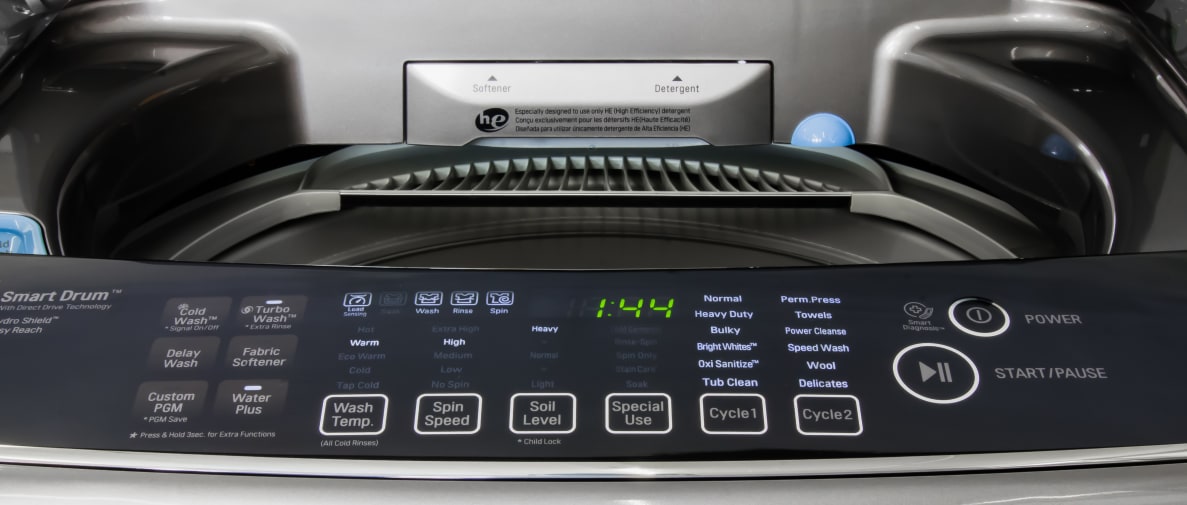Of course, futuristic doodads and huge capacity can't justify a four-figure price tag alone, especially for any washer so similar to the mediocre WT1201. So we put this big grey box through our battery of tests and, unsurprisingly, the results weren't great... only this time you'll pay even more for them.
Design & Usability
Why are there two cycle selectors?
The 1701 (perhaps there are some Star Trek fans at LG?) is certainly one of the prettiest washers we've ever tested. Despite a relatively compact footprint, it's huge. We use standard 8 lb. loads for all our tests, and they are positively lonely inside the gaping maw of this machine's drum. If you've got a large family, it's hard to do much better than 5 cu. ft.
The design is also distinguished by an attractive control panel at the front of the top plate. That means you won't have to reach across the drum to a rear control panel, as is the case for most washers. You will still have to reach to the rear of the machine for the detergent dispenser. Above the control panel is a chrome lip that doubles as a handle for the soft-close door. The door itself doubles as a large, tinted window.
While attractive, the design has some missteps. For instance, the controls are also touch sensitive, and therefore prone to accidents. One errant finger tap while loading the machine is enough to trigger the wrong cycle, start a cycle prematurely, or swap options without realizing what you've done.
All those cycles are inexplicably split into two separate columns. So you have to press the Cycle 1 button to scroll down to Heavy Duty, but the Cycle 2 button to scroll down to Delicates. A dial—or just a single Cycle button—would make so much more sense.
Performance & Features
Oversized but underwhelming
Given the WT1701's gorgeous looks, four-digit price tag, and fancy interface, we hoped it would be good at stain removal. Unfortunately, that wasn't the case. The Normal cycle removed far fewer stains than we'd consider adequate, and was particularly poor against the two most common stains: sweat and dirt. In fact, there are only minor differences between that cycle and Speed Wash, which takes half the time.
{{ photo_gallery name="gallerie!!" }}
The more rigorous cycles, Whites and Heavy Duty, are considerably more effective than Normal, but still failed to match higher-performing machines. They were also quite rough on clothing, and long—almost two hours for Heavy Duty. Even the Delicates cycle is relatively hard on clothing, and did the worst job getting stains out.
At least the WT1701 is on the efficient side. Between electricity, hot water, and cold water, it'll run you about $55 per year to operate, which is about the same as the majority of high-efficiency top loaders, but $25 more annually than the average high-efficiency front-loader.
For in-depth performance information, please visit the Science Page.
Conclusion
There are better choices. They just don't look as good.
For all the technology and chrome, it's easy to forget the WT1701 is still a high-efficiency top loader, and prone to all the disadvantages therein. It can't remove stains as thoroughly as we'd like, but it'll sure wear out your clothes for the effort. Meanwhile, it still uses more water than a front loader.
Save your money for a less flashy, more functional washing machine, like the LG WM3470HVA front loader, or the similarly-priced Whirlpool Cabrio WTW8500BW top loader.
By the Numbers
Our suite of lab tests comprised more than 18 test loads for the LG WT1701C, including measurements for hot and cold water requirements, electricity usage, water temperature, and water retention. We gauge stain removal using controlled, pre-soiled testing cloth, and report results relative to AHAM industry standards. Clothing wear is tested with controlled mechanical action cloths, which fray according to agitation intensity.
Cleaning Performance
All of the WT1701's tested cycles underperformed the competition, including the normally powerful Whites and Heavy Duty cycles. Together with Normal, these three cycles only did an excellent job removing cocoa. Other stains—be they sweat, dirt, blood, or red wine—will be sticking around longer than you'll like.

Amazingly, the WT1701 also managed to wear out clothes without cleaning them. We noted an average of 81 frayed threads on our mechanical action test cloths from both the Whites and Heavy Duty cycles, which is an excessive number. The Normal cycle didn't fare much better at 58 frayed threads, and even the Delicates cycle frayed 22 threads, which is poor for this setting.
Efficiency
For a top-loader of this class, the WT1701 offers average efficiency. Based on the laundry habits of a typical American family, we estimate this washer's operating cost will be $55.76 per year in electricity and water. The cost of each individual Normal cycle is $0.09, and each Whites cycle will run you $0.38. Strangely, the Heavy Duty cycle, which offers similar performance, is far less costly than the Whites cycle at only $0.09—just like the Normal cycle.
Some cycles do a decent job spinning out excess moisture, which helps reduce the workload for your dryer. The Normal, Heavy Duty, and Speed Wash cycles retained only 60%, 59%, and 56& moisture respectively. The Delicates cycle avoids high-speed spinning, which led to 87% water retention.
Meet the tester
Chris was born and raised less than ten miles from our editorial office, and even graduated from nearby Merrimack College. He came to Reviewed after covering the telecom industry, and has been moonlighting as a Boston area dining critic since 2008.
Checking our work.
Our team is here for one purpose: to help you buy the best stuff and love what you own. Our writers, editors, and lab technicians obsess over the products we cover to make sure you're confident and satisfied. Have a different opinion about something we recommend? Email us and we'll compare notes.
Shoot us an email


